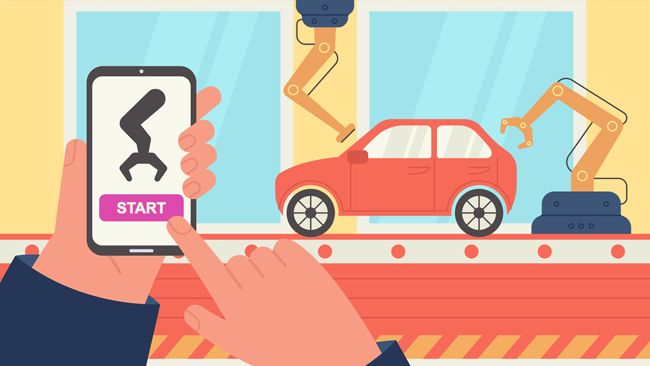As technology continues to advance at a breakneck speed, the automotive industry isn’t getting left behind. Automakers have been embracing new and innovative technologies for decades, from self-driving cars to electric vehicles.
The technological revolution is changing the way people experience driving—vehicle safety has increased drastically, environmental concerns are becoming more urgent, and convenience features like GPS navigation are now commonplace.
In this blog post, we’ll explore how these emerging technologies are transforming the automotive industry and what implications they have for its future.
The History of the Automotive Industry and How It Has Evolved With Technology
Since the dawn of the automotive industry, it has been revolutionized by advances in technology. Once thought of as a luxurious, out-of-reach form of transportation only available to the wealthy, cars have become an everyday necessity for commuters everywhere.
From early models that ran on steam, to pre-WWII models powered by gasoline, to modern 2030s models run on electric and renewable energy, it is evident how far technology has pushed the car into the future.
With each technological advancement, cars became more fuel efficient, safer to drive, and more comfortable for their passengers.
As automakers continue to innovate with advancements such as self-driving features and integrated phones and music devices, there is no doubt that the automotive industry will continue to captivate its audiences.
The Future of the Electric and Hybrid Cars
The future of electric and hybrid cars is incredibly exciting. As technology advances, so do the efficiency and capability of these cars.
Widely available charging infrastructure, improved battery life, and access to more powerful electric motors will power a new era of electric and hybrid vehicles that spare the environment from excessive emissions while also giving drivers more control over their ownership experience.
We are already seeing greater availability of these vehicles across all major automakers, providing drivers with increased options for an inexpensive, reliable mode of transportation. Soon we will be able to look back at the auto industry’s dependence on gasoline as an era in the past.
Technology in the Automotive Industry Introduced Us to Car Warranties and Auto Transport Services
The automotive industry has been greatly revolutionized by the introduction of technology in recent years. Car manufacturers have developed comprehensive warranties, giving drivers peace of mind knowing that their vehicles and their components will be properly taken care of in the event of any issues. Protect My Car warranty is just one example of just one such company that offers protection through car warranties to their customers.
Additionally, we now have access to car transport services that drastically reduce the stress and time involved with moving a car from one place to another.
Thanks to technology, aspects of the automotive industry that used to be complicated and labor-intensive are now much easier and more convenient for everyone involved.
How Technology Has Changed the Way We Drive
In the last two decades, technology has completely revolutionized how we drive. From cars equipped with self-driving systems to using Google Maps or Waze apps to navigate through unfamiliar streets, it’s remarkable how much our experience on the roads has been enhanced.
On top of that, a myriad of safety features such as blind spot monitoring and automatic emergency braking have become available in almost all modern cars and play an integral role in preventing accidents.
If you’re in the market to buy a car, you can also use technology to research vital car information about the make or model that you are purchasing. The internet makes it easy to read reviews, compare features and find out more about a car before you even set out to test drive it.
Technology also makes our lives more convenient: from automatic car starters to remote keyless entry, we no longer have to manually start the car or fumble around for keys. All in all, technology has made driving faster, safer, and smoother for us today.
The Future of the Automotive Industry and How Technology Will Continue to Play a Role
As technology continues to evolve, the automotive industry will be in a state of constant evolution as well. Automakers are already starting to incorporate more high-tech features into their vehicles, from self-driving capabilities to internet connectivity.
But that’s just the beginning. In the future, automobiles may become even more reliant on technology to ensure safer, more efficient transportation for up to 10 times the amount of miles per gallon for fuel economy.
With new advancements such as smart highway systems, efficient and green energy sources, and more advanced safety features like facial recognition and an array of sensors, our roads will become much smarter and more connected than ever before.
This is all part of an effort to make automobiles safer while also reducing carbon emissions. The automotive industry is expected to stand as one of the most innovative industries in history with its continued reliance on technology, adaptability, and creativity.
The Impact of Technology on Jobs in the Automotive Industry
The automotive industry is no stranger to rapid technological change. Thanks to advancements in computer software, robotics, and automation, the way vehicles are produced and serviced has been completely revolutionized.
An ever-growing range of tasks in the automotive world demands a higher level of technical expertise, which in turn means more specialized jobs are being created as technology becomes increasingly more important. At the same time, however, older jobs and skill sets are becoming redundant due to computers taking over basic, repetitive tasks that have traditionally been done by hand.
As such, the technological shift in the automotive industry has drastically altered job opportunities and career paths while making many older jobs obsolete.
It’s an exciting yet challenging time for all those involved but one thing is certain: the automotive industry is not immune to disruption from emerging technologies and new business models.
How Automotive Technology Affects Our Environment and the Ways We Can Reduce Our Carbon Footprint
Automotive technology has advanced tremendously over the past few years, allowing us to drive smarter, more efficient cars than ever.
But these advances come with a price – increasingly higher levels of carbon dioxide in the atmosphere that contribute to global warming and environmental issues like climate change.
Thankfully, there are many ways of reducing our carbon footprint while still enjoying the benefits of automotive technology. We can start by driving more fuel-efficient vehicles, as well as carpooling or taking public transportation whenever it’s convenient.
Additionally, utilizing renewable energy sources to charge electric vehicles is becoming increasingly accessible. Taking these steps towards a greener lifestyle can help mitigate some of the negative effects of automotive technology and create a healthier environment for future generations.
Final Thoughts
Automotive technology is undoubtedly revolutionizing the automotive industry, providing us with unparalleled levels of convenience, safety, and efficiency.
This shift has had an impact on jobs in the industry and has also caused a rise in carbon emissions that have to be addressed. However, there are ways to reduce our carbon footprint while still enjoying the benefits of technology.




Leave a comment
Have something to say about this article? Add your comment and start the discussion.